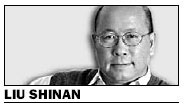
On Monday, most Chinese newspapers and news websites carried a photograph of Premier Wen Jiabao sitting in a classroom in a high school in Beijing, listening attentively to the teacher and noting down what the teacher said. The photograph was on Friday, when he was investigating into China's schools.
While I was moved because of the concern shown by the government leader for the education of our younger generation, I was somewhat worried over what I saw in the picture.
Of the five boys sitting in the front rows before the premier, four were wearing glasses. They were bent over their desks writing with their eyes just a few inches from the notebooks. I couldn't help worry that their eyesight would worsen soon.
Ironically, the 67-year-old premier sat with his back perfectly straight - in a standard posture as is required in the Basic Knowledge and Requirements for the Protection of Eyesight of Primary and Middle School Students, issued by the Ministry of Education.
Shortsightedness is alarmingly serious among Chinese students. A recent survey shows the incidence of myopia is 22.78 percent among primary school pupils, and 55.22 percent and a whopping 76.74 percent among high school and college students. Myopia-related cases among all Chinese youths has reached a high of 60 percent, second only to that in Japan, according to the latest survey, conducted jointly by the Ministry of Education and Ministry of Health. Twenty years ago, it was only about 30 percent.
What is more worrisome is that cases have been growing at an annual rate of 5 percent in recent years.
If this situation continues, the quality of our future workforce will deteriorate so much that our nation's development will be seriously impaired.
In fact, there are already signs of such deterioration. Some marine navigation colleges have reportedly had to lower the floor marks for enrolment to meet the requirement on eyesight. But still many students with high marks were disqualified because of myopia.
The phenomenon is the result of too heavy a burden of study, imposed by teachers and parents, on youngsters. Given the current trend - the teachers' aspiration for higher performance assessment and the parents' eagerness to see their children's "academic attainment", it seems unrealistic that the burden will be reduced significantly any time soon. But we could do at least one thing: reflect on, and correct, the way we let our kids spend their spare time.
Ophthalmologists tell us that the crystalline lens and ciliary muscle of a youth's eyes have a strong ability for self-recovery as long as proper methods are adopted to reduce the tension on the eyes caused by hard work. Looking into the distance, especially during outdoor activities, is the best way to let our eyes rest.
Chinese students, however, hardly perform much outdoor activities. Most of their pastime is spent playing video games or watching TV, which their parents allow as a reward for their "hard study". Their eyes hardly get any rest.
When I was a child, we students played outdoor games after school and often went to the outskirts to catch fish and insects for fun. Every summer vacation, my parents sent me to my grandparents in the countryside. It was a great relief from my school studies.
A very small percentage of students of my time suffered from myopia, though unfortunately I developed shortsightedness after I entered senior high school.
Schools and education authorities should take resolute measures to increase outdoor activities for youngsters. Summer and winter vacations are especially important for students to get a respite from their hard work of several months.
I hope there is a law to ban all academic work for students during vacations. The idea may sound too radical. But I believe in the old saying: Overcorrecting is necessary in righting a wrong. It is necessary for any corrective measure in today's China.
E-mail: liushinan@chinadaily.com.cn
About the author:
劉式南 高級(jí)編輯。1968年畢業(yè)于武漢華中師范學(xué)院(現(xiàn)華中師范大學(xué))英文系。1982年畢業(yè)于北京體育學(xué)院(現(xiàn)北京體育大學(xué))研究生院體育情報(bào)專業(yè)。1982年進(jìn)入中國日?qǐng)?bào)社,先后擔(dān)任體育記者、時(shí)政記者、國際新聞編輯、要聞版責(zé)任編輯、發(fā)稿部主任、《上海英文星報(bào)》總編輯、《中國商業(yè)周刊》總編輯等職。現(xiàn)任《中國日?qǐng)?bào)》總編輯助理及專欄作家。1997年獲國務(wù)院“特殊貢獻(xiàn)專家政府津貼”。2000年被中華全國新聞工作者協(xié)會(huì)授予“全國百佳新聞工作者”稱號(hào)。2006年獲中國新聞獎(jiǎng)二等獎(jiǎng)(編輯)。
相關(guān)閱讀:
Fireworks ban will kill a tradition
Crisis can't kill Chinese confidence
Holders should not pay for fake money
Teachers are not children's punching bags
